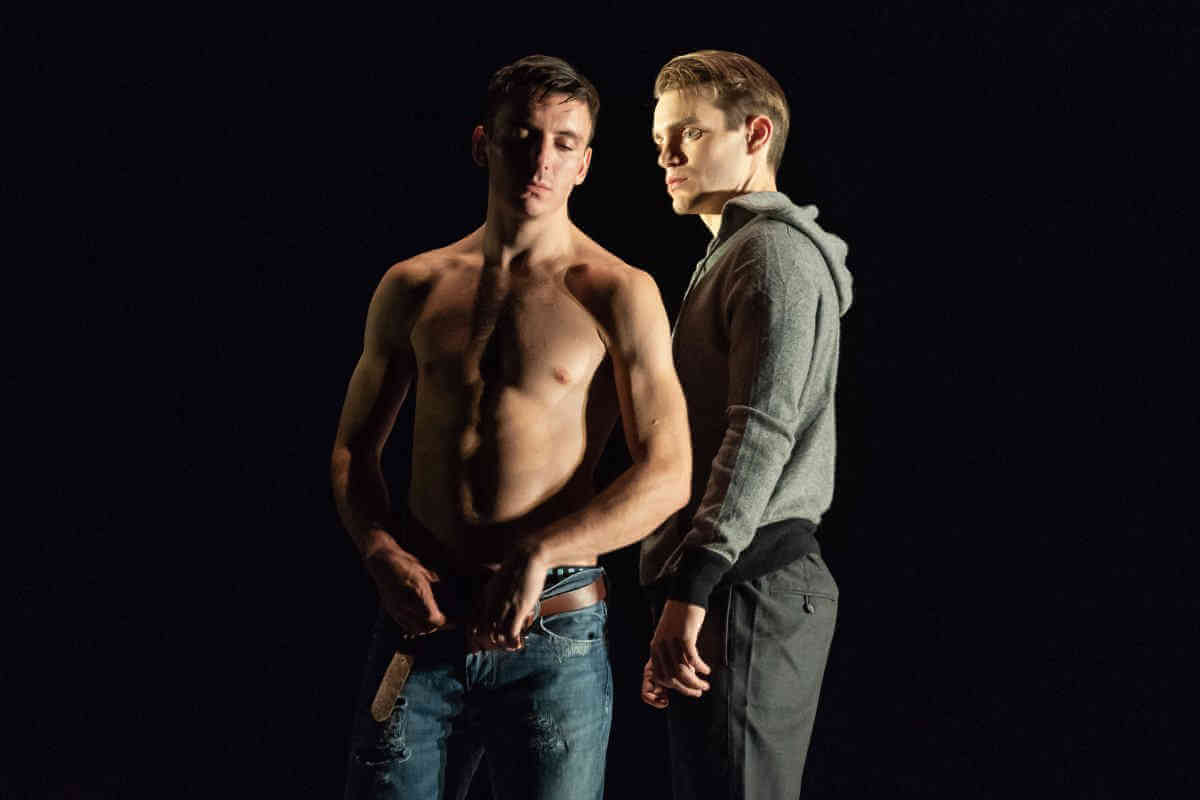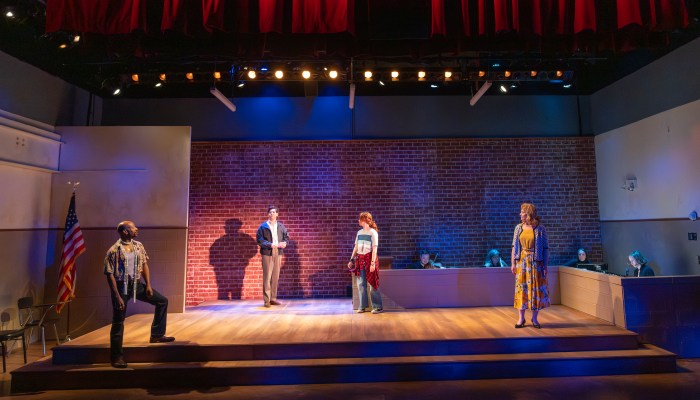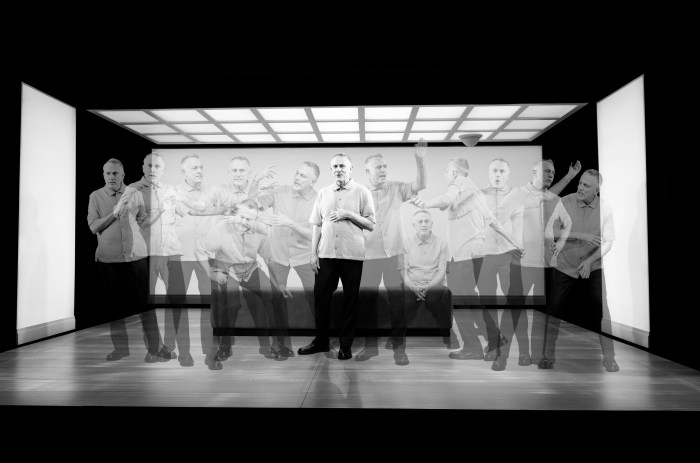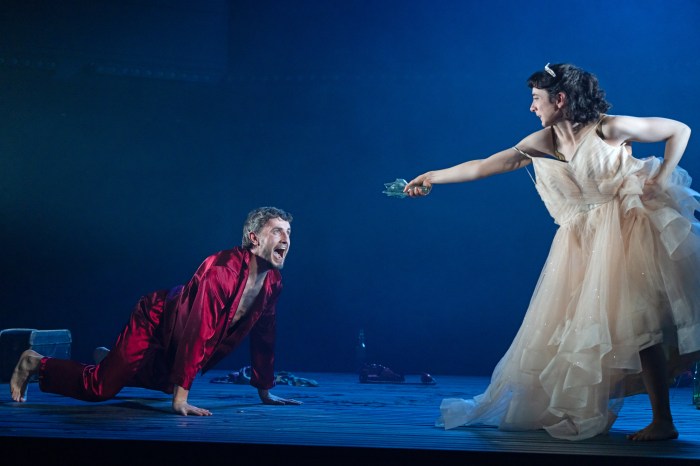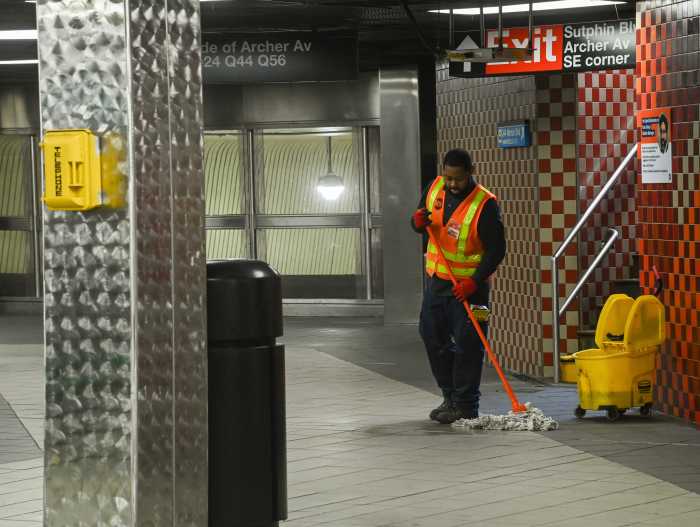When a teenaged Matthew Lopez begged his mom to drive him to see the film adaptation of “Howards End,” he had no clue that E.M. Forster’s 1910 masterwork would exert such a profound impact on his adult life. Some two decades later, he ended up crafting a play inspired by the novel that grapples with themes of family, identity, legacy, and finding one’s place in the world. And how we thrive when we connect with others.
Naturally, Lopez put his own vigorous spin on it by transporting the crux of the narrative to modern-day New York. Various social classes are represented by different generations and Forster’s straight characters are now gay men. Even Forster (played by Paul Hilton) appears from time to time, a sage emissary from an earlier era where being openly gay was unthinkable, not to mention illegal. (Forster lived his entire life deep in the closet, hiding his queer-centric novel “Maurice” to be published only after his death.)
Lopez titled the play “The Inheritance” referencing, among other things, a pivotal point in “Howards End” where the titular country house falls into the hands of Henry Wilcox, a business tycoon, after his wife’s death. Never mind that the house was actually bequeathed to the novel’s thoughtful protagonist, Margaret Schlegel, faced with losing her longtime family manse in London.
In Lopez’ play, the enchanting country house is located in upstate New York and is transferred to Henry (John Benjamin Hickey, who won the Best Featured Actor Tony Award for “The Normal Heart”) after the death of his longtime partner, Walter (also played by Hilton). Eric Glass (Kyle Soller), ostensibly a stand-in for the Margaret character, is a starry-eyed activist confronted with losing the sprawling rent-controlled apartment on Manhattan’s Upper West Side he hoped to inherit from his grandmother.
Subbing for Margaret’s sentimental younger sister, Helen, is Toby Darling (Andrew Burnap), an impetuous, narcissistic novelist. Also in Eric’s orbit are Adam, a conniving actor, and Leo, a down-and-out rentboy (both played by Samuel H. Levine).
Populated with an array of urbane, vivacious characters, “The Inheritance” paints an affectionate albeit messy portrait of contemporary gay life in New York — a life that requires visits to the Whitney and the Strand Book Store, curated brunches in the Hamptons, and drug-fueled pool parties in the Pines. An intriguing parallel to Forster’s Schlegels and their artsy, erudite circle in London.
Regrettably, the young men are largely ignorant of the battles fought by the generation before them to secure rights like gay marriage and medical breakthroughs like HIV antivirals that they take for granted. That’s where Henry and Walter come in, to teach them essential gay history. The devastation wrought by the AIDS pandemic hangs over the play like a specter.
Inspired by the scope and depth of the novel, Lopez decided to go for broke. His drama is of epic proportions, spanning nearly two centuries and presented in two parts for a total of nearly seven hours. It’s an ambitious elegy of time and memory that boasts an ensemble of 14, with most actors playing multiple roles.
Helmed by the gifted British director Stephen Daldry (“Billy Elliot,” “The Hours”), the drama debuted at the Young Vic in London and then took up residence at the Noël Coward Theatre in the West End, where it enjoyed a sold-out run. The life-affirming play dominated the Oliviers last season, winning four awards including Best New Play and Best Director. Soller won the Best Actor Award. The Telegraph crowed, “Perhaps the most important play of the century.”
And now the production has landed on Broadway, with a few tweaks. The principal cast members are reprising their roles, while the secondary roles have been recast with American actors. The sole female character was played by the one and only Vanessa Redgrave in London; the Broadway transfer stars another theater great, Lois Smith.
Gay City News sat down with two cast members involved with the production from the start, Hickey and Burnap, to parse the significance of the drama. You might say that Hickey, born in 1963, represents an older generation while Burnap, born in 1991, typifies a younger generation. Both currently call New York City home. Following are edited excerpts from the conversation.
DAVID KENNERLEY: Congratulations on the phenomenal success of “The Inheritance.” How does it feel bringing the show to Broadway?
ANDREW BURNAP: It definitely feels like we’ve brought it home, with all the joy and excitement and anxiety associated with that word. The whole time we were doing it in London, we felt it was destined to be here. All the references that move the action are about New York. Stephen once joked that the London run was essentially a $2 million workshop for Broadway.
JOHN BENJAMIN HICKEY: The first time I read the script I thought, “Oh my God — this is in many ways an old-fashioned Broadway dramatic comedy.” It’s crazy to call it that but that’s part of Matthew’s great gift, he is so witty and expansive. The show is so generous and accessible to an audience.
KENNERLEY: Andrew, years ago you starred in another Matthew Lopez play, “The Legend of Georgia McBride” in Los Angeles.
BURNAP: Yes, that’s how I met Matthew. Sometime after, I vividly remember getting an email from my agent about working on Matthew’s new play, “The Inheritance,” slating me for the Adam/ Leo role. I was champing at the bit to work on another play and thought it sounded great. But when I mentioned it to Matthew, he said I was way too old for that part. And that was it, end of conversation. I was shocked. Months went by, and then I was asked to do a workshop playing one of the young men, which was amazing.
For a second workshop, I was supposed to reprise that role, but Matthew called me the night before saying the actors he was pursuing for the part of Toby were not available and asked me to do him a favor and play Toby for the week. But he also warned, “Ultimately you will not play the part in the production.” Lucky for me, that ended up not being the case.
HICKEY: I remember I was about to head to Calgary to do a TV show when I got a call that Stephen Daldry wanted me for “The Inheritance.” By chance I was watching “The Crown” — Stephen was one of the directors — and I was so obsessed with it I said yes before I even read the script. I didn’t realize it was nearly seven hours long. I was so hungry to work with a visionary director like Stephen.
KENNERLEY: Andrew, could you talk about Toby Darling and what makes him tick?
BURNAP: Many things. What I love so much about Toby is his appetite for life to the nth degree. That makes him so attractive, he’s sort of like a magnet. On the surface he’s the life of the party, the loudest person in the room. As someone who is often the opposite of that, I find such people fascinating. I always wanted to be like that naturally. Toby comes at new things in a bombastic way, without hesitation, and I admire that. It creates some hilarious, beautiful moments and also some truly terrifying moments.
HICKEY: When I first read the script, Toby registered as a very tragic character. But the way Andrew plays him, he is not a victim — he absolutely loves the entire experience of life. There is great darkness, but Andrew has a wonderful flair for infusing levity. It makes the heartbreak of Toby Darling all the more devastating.
KENNERLEY: John, what about Henry Wilcox?
HICKEY: What makes Henry tick is money. He is of a generation that was decimated by the plague and that calamity forces him into the closet. He is emotionally unavailable. When he meets a younger group of gay men who have a strong sense of community, he begins to come alive. He never had that in his life because he was so paralyzed by what happened to his peers in the early 1980s. He also happens to be a conservative gay Republican. You don’t see that too often onstage.
KENNERLEY: The play focuses on the special kinship among gay men across generations. Why does this connection matter?
BURNAP: With every new generation there’s an acceptance of the way things currently are without a profound understanding of what’s come before. You cannot possibly understand where you are, the troubles that a generation faces, without knowing what the previous generation fought for.
HICKEY: As gay people, as Jews, as African Americans, you need to know where you’ve come in order to create your own space in the world. In the gay community, there’s this astonishing divide between generations. Today it’s about PrEP and being able to fuck, often without a condom, and to live without the fear of death. The generation just before them lived through a holocaust. How do you build that bridge? It’s not about what debt do you owe, it’s acknowledging where you came from to be who you are.
KENNERLEY: The play is not so much a literal modern-day update of “Howards End,” but rather meditation on its themes and characters. What are the key themes?
BURNAP: I think they’re legacy, love, and loss. The three L’s.
HICKEY: It’s about taking care of each other and learning about who we are by looking at where we have been. This play could be titled “The Book That Saved My Life.” Matthew has stated that this novel was his salvation. It’s not just about finding connection as a gay man with the people who came before you. It’s about words and language and art as lifesaving. I think that’s the beating heart of the play.
It’s also about addiction. Mathew has been open about his earlier alcoholism and his recovery. The grip of addiction can be every bit as fatal as any terminal illness. As with AIDS, some people make it and some people don’t.
KENNERLEY: One central theme is finding one’s place in the world, or as Forster’s Bloomsbury buddy Virginia Woolf said, “a room of one’s own.” Would you agree?
HICKEY: Absolutely, the play is all about finding home. Disenfranchised men. Sick gay men. Eric becomes homeless, Toby and Leo become homeless. Even Henry in his own way is rootless, despite owning five houses. The bigger metaphor is what this country should be. America should be a safe haven in these troubling times. A significant part of the population does not feel safe here. We have a lot of room. That’s what the play is about, offering home.
KENNERLEY: “The Inheritance” is often compared to “Angels In America.” Do you think the comparison is a fair one?
HICKEY: I don’t feel comfortable with it. I’m a student of “Angels,” it’s one the singular greatest achievements in the history of American theater. “The Inheritance” is totally different. I don’t think it is political like “Angels,” or at least it’s subversive in its politics. “Angels” is a fantasia, while our play is a more human drama. I have the most profound respect for both plays. Surely Matthew would agree he was inspired by the ambition of “Angels” on some level.
BURNAP: Both works trace generations of gay men and are similar in their epic, two-part structure. But now we are in a completely different time and each raises divergent questions. “Angels” asks, “Who has the power and who does not?” Our play asks “Now that you have this power, what do you do with it, and what do you owe your predecessors?
KENNERLEY: The play aims to build a bridge between queer generations. Andrew, given that you were not even born during the darkest days of the AIDS crisis, what has the play taught you in terms of queer history?
BURNAP: A line in the play talks about how queer subculture has been co-opted into the mainstream without its deep center. Growing up in Rhode Island, I was taught almost nothing about AIDS and queer history. I knew about Stonewall but none of the specifics. I did not know who Larry Kramer or Willi Ninja were. Or what the Reagan Administration did or didn’t do during that horrific time.
It was quite a shock to learn the extent of the AIDS epidemic. I felt a deep sense of pain and guilt, ashamed that I didn’t know that hundreds of thousands of men in their prime lost their lives. Those feelings turned into anger, then resolve. I felt I had to do something so people after me would know what happened.
KENNERLEY: Andrew, John is of an older generation than the rest of you. Have you learned from him behind the scenes as well?
BURNAP: Yes, during breaks or over drinks, he might relate firsthand experiences of those lost and those who are still here. We’ve spent time watching period queer movies together. There was an incredible timeline in the rehearsal room chronicling key LGBTQ milestones from the 1970s to now. It drove home a visceral understanding of what went on.
HICKEY: There’s a bond you create that has nothing to do with the specifics of, say, the AIDS crisis. There’s a joy I have as an older person being around these vital, brilliant young actors. After the first few weeks, the relationship goes well beyond avuncular. It feels paternal. I wouldn’t trade places with them, I have no envy for their youth, and I’m quite comfortable in my skin. That’s exactly what the play is about, too.
THE INHERITANCE | Ethel Barrymore Theatre, 243 W. 47th St. | In previews, schedule varies; from Nov. 17 opening: Part 1: Sat.-Sun. & Wed. at 1 p.m., Thu. -Fri. at 7 p.m.; Part 2: Sat.-Sun. & Wed. at 7 p.m. | $69-$199 at TheInheritancePlay.com | Each part is three hrs., 15 mins., with two intermissions


